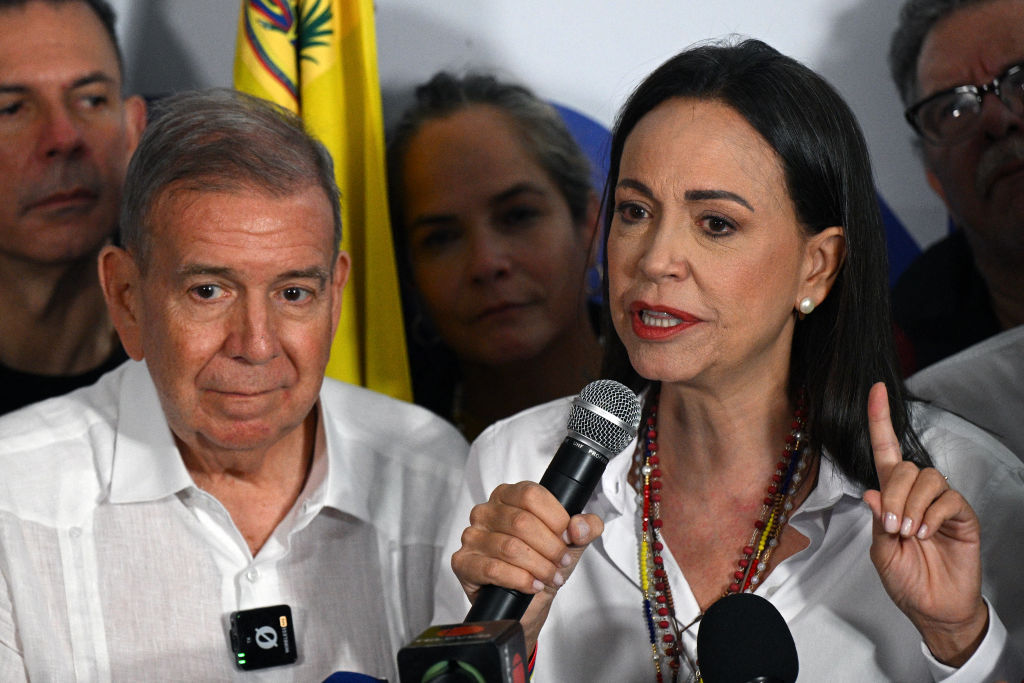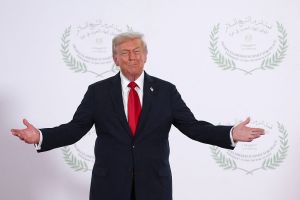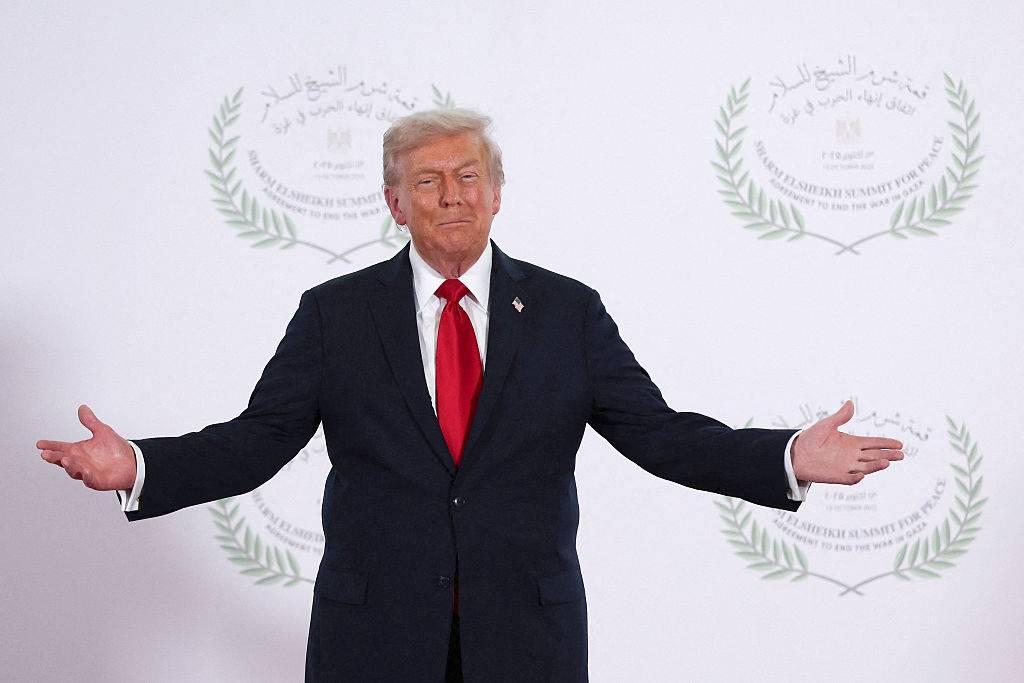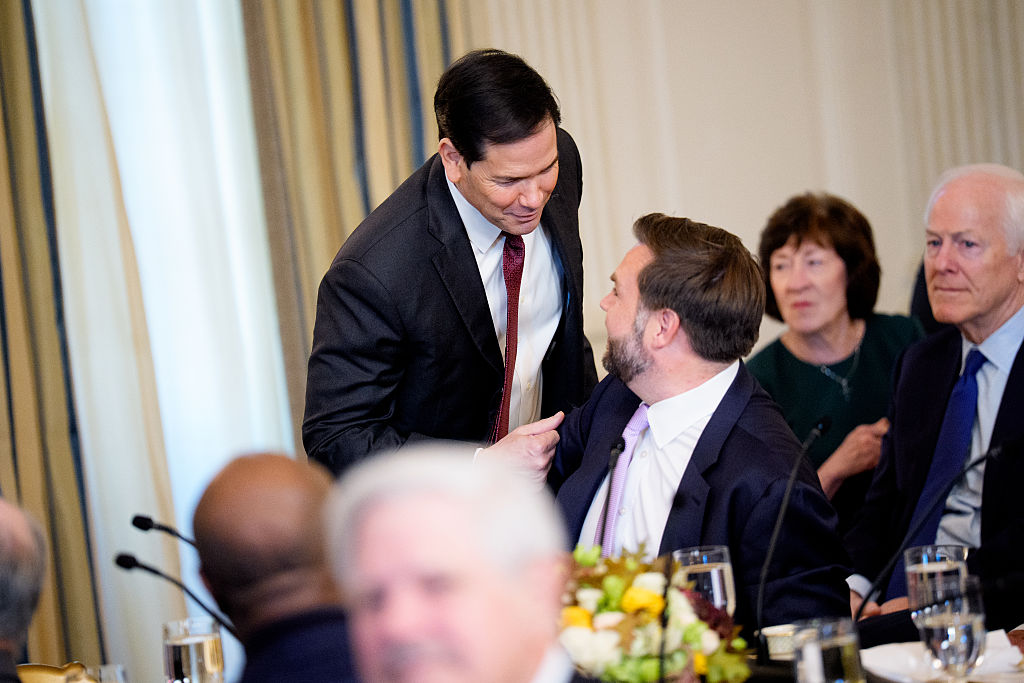Sunday night was a long one in Venezuela. At midnight, the much anticipated yet dubious results came in for the South American country’s election. The head of the National Electoral Council, Elvis Amoroso — a close ally of Venezuelan president Nicolás Maduro who has served as a deputy for his party — said that with 80 percent of ballots counted, Maduro had won with 51 percent of the vote. His rival, Maria Corina Machado’s replacement, Edmundo González, ended with 44 percent.
The opposition has a different story. “Venezuela has a new president and his name is Edmundo González Urrutia. We won! And everyone knows it,” Machado said from a press conference following some silence after Maduro’s announced win. “I want you to know that this has been something so overwhelming and big that we have won in all sectors of the country,” she said in the early hours of Monday morning.
“The Venezuelans and the entire world know what happened,” González said. Striking a delicate balance, the leaders argued that the armed forces have a constitutional duty to safeguard the democratic process and called for peaceful assembly. “We don’t want violence,” Machado urged, arguing that “How could we want violence when our calls are for people to bring their families with them? Who would bring their families?”
The argument for fraud is simple. At 40 percent of rallies counted, González was leading by around a 30 percent margin, as the polls suggested. With an extensive operation, involving the opposition’s observers in each polling station, the process was closely monitored and shared with governments throughout the world. From the very beginning, Machado and her allies knew fraud was on the table; their goal was to mobilize enough people to make the regime’s dishonesty evident as ever.
Maduro’s electoral council didn’t release the tallies from each of the 30,000 polling booths nationwide. They argued that those would follow in the “coming hours.” Analysts tell The Spectator that the early announcement comes as tensions within Chavismo intensify. The more negotiation-minded actors in the socialist coalition had no rush, but propelled by the likes of former vice president Diosdado Cabello, who was hinting at a win from the moment the polls closed, Maduro ultimately announced his premature win. His goal: get some headlines and test loyalty before things get rockier.
Following the middle-of-the-night announcement, from Tokyo, secretary of state Antony Blinken said, “We have seen the announcement just a short while ago by the Venezuelan Electoral Commission. We have serious concerns that the result announced does not reflect the will or the votes of the Venezuelan people.” Equally this morning, Vice President Kamala Harris tweeted, “The United States stands with the people of Venezuela who expressed their voice in today’s historic presidential election. The will of the Venezuelan people must be respected. Despite the many challenges, we will continue to work toward a more democratic, prosperous, and secure future for the people of Venezuela.”
Following Blinken’s lead, others joined in. Chilean (and leftist) president Gabriel Boric said, “The Maduro regime should understand that the results it published are difficult to believe. We won’t recognize any result that is not verifiable.” The European Union’s foreign policy chief Josep Borrell said Venezuelans’ “will must be respected. Ensuring full transparency in the electoral process, including detailed counting of votes and access to voting records at polling stations, is vital.”
More forcefully, Peruvian foreign minister Javier González-Olaechea said, “I condemn in all extremity the sum of irregularities with the intention of fraud committed by the Venezuelan government. Peru will not accept the violation of the popular will of the Venezuelan people.”
“The Peruvian ambassador to the Bolivarian Republic of Venezuela has been immediately recalled for consultations.” Argentinian president Javier Milei said, “Argentina will not recognize another fraud, and hopes that this time the Armed Forces will defend democracy and popular will.” Ecuador, Uruguay, Panamá, Guatemala and Costa Rica all shared similar statements, casting doubt on Maduro’s win.
Colombian foreign minister Luis Gilberto Murrillo, rather agnostically, said, “After maintaining permanent contact with all political actors involved in the presidential elections… We call for the total vote count, its verification and independent audit to be carried out as soon as possible.” It’s important to note that Colombia is now led by Gustavo Petro, who has been comparatively sympathetic to Maduro’s government. Their lack of early support is bad news for Chavismo.
On the supporting side, Nicaraguan president Daniel Ortega, Bolivian president Luis Arce, Honduran president Xiomara Castro, Cuban president Miguel Díaz-Canel, Xi Jinping and Vladimir Putin all publicly accepted the results.
Brazilian president Lula da Silva is notably silent. Less than a week ago, he had a spat with Maduro when he preemptively advised him to accept the results. Lula was a close ally of Venezuela’s Hugo Chávez and his role is believed to be extremely important in the behind the scenes process. At around 10:30 a.m. today, the Brazilian ministry of foreign affairs said that they welcome “the peaceful nature of the election day in Venezuela and closely monitors the scrutiny.”
Next to Boric and Milei, Brazil’s statement looks like a placeholder. Evidently, they are playing the long game. Geopolitically speaking, if Brazil is to join Argentina, with whom they share regional hegemony, things could surely get dark for Maduro.
From the US’s perspective, if there’s a moment to apply pressure, it’s now. American diplomats will likely be on the phone with their Latin American counterparts, especially in Brazil, all day. A Lula that rejects Maduro spells doomsday for his allies, likely accelerating discord within Chavista circles.
Maduro’s fraud was predictable, but the regional response, so far, has been surprising. The next days will define Venezuela’s future, a regional power player that is credited as the major financial backer of twenty-first century socialism. The US’s role, potentially pushing left-wing Colombian and Brazilian leaders into rejecting Maduro, will be essential. Will the US fully pursue it? No one knows. But in theory, if the US can truly and fully isolate Maduro, change may very well be on the horizon.


























Leave a Reply